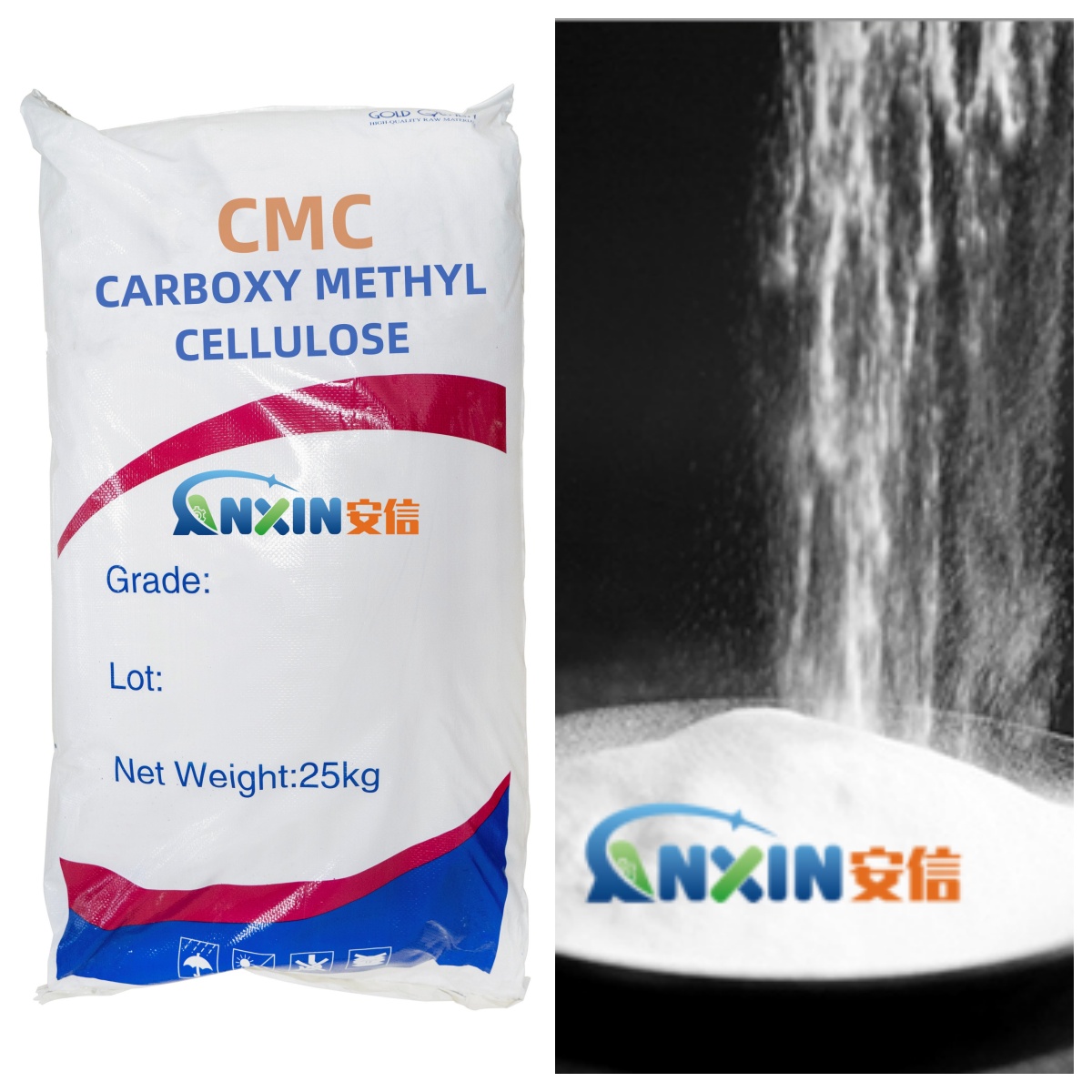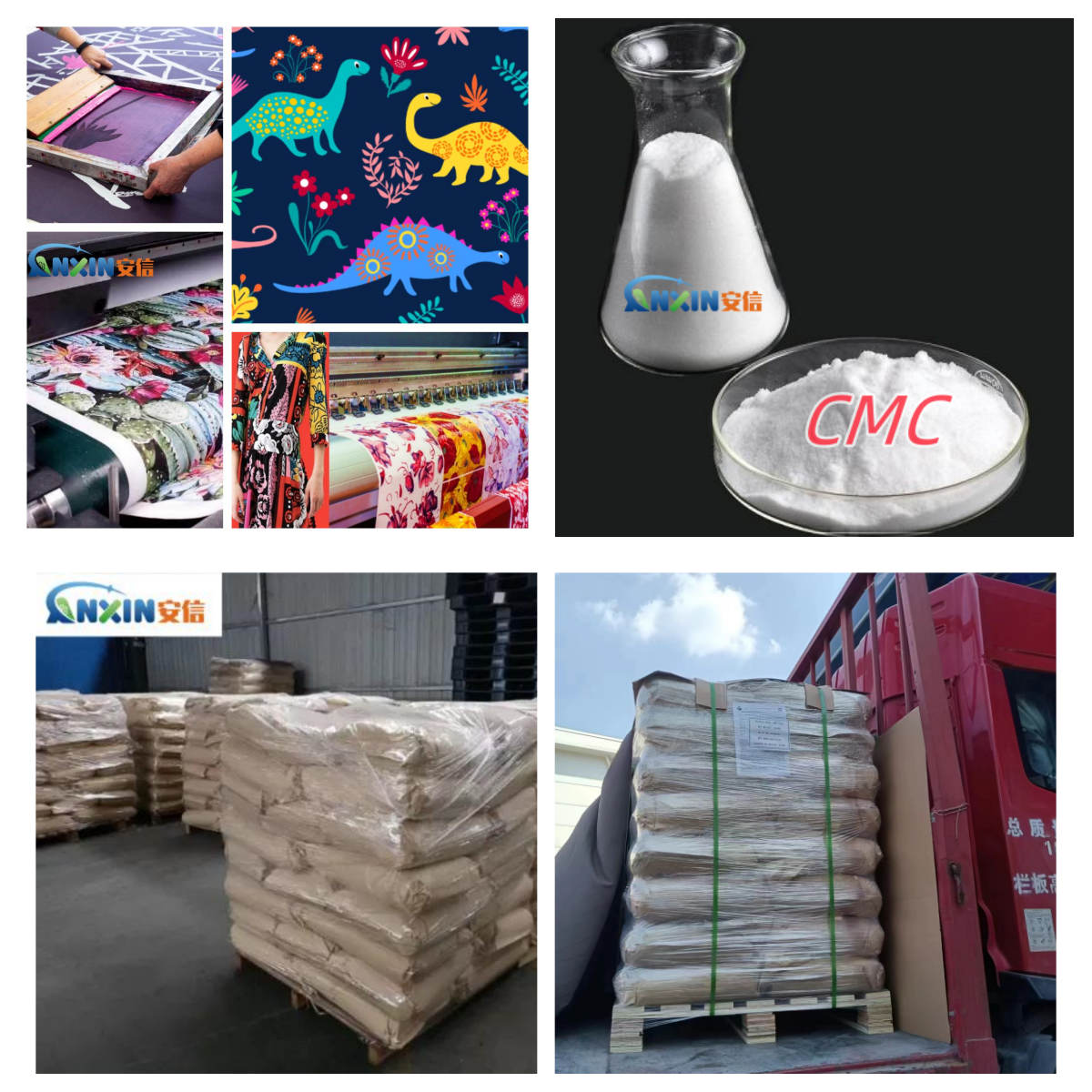AnxinCel® CMC for Textile Printing and Dyeing
In the modern textile industry, where precision, consistency, and environmental sustainability are critical, the demand for functional additives has grown tremendously. One such multifunctional and eco-friendly additive is Carboxymethyl Cellulose (CMC). Among the leading brands in this domain, AnxinCel® CMC stands out due to its excellent quality, performance, and adaptability.
1. What is AnxinCel® CMC?
AnxinCel® CMC is a sodium salt of carboxymethyl cellulose, derived from natural cellulose. It is a water-soluble polymer that serves as a thickener, stabilizer, film-former, and water retention agent. Its molecular structure includes carboxymethyl groups (-CH2-COOH) attached to the cellulose backbone, imparting it with high water solubility and functional versatility.
AnxinCel® CMC is available in different grades, tailored to specific textile applications such as reactive dye printing, vat dye printing, acid dye printing, and other formulations requiring reliable rheological behavior and paste stability.
2. Role of CMC in Textile Printing
In textile printing, CMC functions primarily as a thickening agent for print pastes. It gives the required viscosity to the dye paste, allowing for precise and even application of dyes onto fabric surfaces. Its performance characteristics directly affect the quality of the printed fabric.
Key Functions:
Thickening: Provides high viscosity at low concentrations, enabling control over print paste flow and penetration.
Rheology Control: Ensures pseudoplastic behavior (shear thinning), essential for smooth application during screen or roller printing.
Water Retention: Prevents premature drying of dye paste on screens or fabrics.
Film-Forming Ability: Helps form a continuous film that holds the dye in place during steaming or fixation.
Print Sharpness: Ensures fine pattern resolution with reduced bleeding or smearing.
Wash-Off Ease: Facilitates easy removal during post-print washing without leaving residues.
3. Application in Textile Dyeing
In dyeing processes, especially pad dyeing and yarn dyeing, CMC plays a supporting role by stabilizing dye baths, improving the uniformity of dye application, and enhancing penetration in cellulosic fabrics like cotton and rayon.
Benefits in Dyeing:
Enhances viscosity of dye liquor, improving dye uptake.
Improves dye leveling and uniformity.
Reduces dye migration during drying.
Compatible with a wide range of anionic and nonionic dyes.
4. Advantages of AnxinCel® CMC in Printing and Dyeing
AnxinCel® CMC offers several distinct advantages over traditional thickeners like starch or synthetic polymers:
4.1. Eco-Friendliness
Derived from natural cellulose.
Biodegradable and safe for the environment.
Reduces dependency on petrochemical-based thickeners.
4.2. Cost Efficiency
High thickening efficiency lowers usage levels.
Excellent water retention reduces paste drying and improves working time.
4.3. High Compatibility
Compatible with various dye classes (reactive, disperse, vat, acid).
Stable across a broad pH range and with most dyeing auxiliaries.
4.4. Enhanced Print Quality
Smooth flow through screens.
Reduces tailing, bleeding, and uneven dye distribution.
Improves edge definition and pattern sharpness.
4.5. Improved Washing and Finishing
Easily removed in cold or warm water washes.
No residue or film on fabric.
Maintains fabric hand and brightness.
5.Technical Performance Parameters
| Property | Typical Range (varies by grade) |
|---|---|
| Appearance | White to off-white powder |
| Degree of Substitution (DS) | 0.6 – 1.2 |
| Viscosity (2% solution) | 100 – 6000 mPa·s |
| Purity | >99.5% |
| Moisture Content | <10% |
| pH (1% solution) | 6.0 – 8.5 |
| Solubility | Fully soluble in cold water |
6. Grade Selection and Optimization
AnxinCel® CMC is available in various grades, allowing customization according to:
Fabric type (cotton, viscose, silk)
Printing technique (flatbed, rotary, screen)
Dye class
Desired paste viscosity
Low-viscosity grades are suitable for high-speed printing or fine pattern work, whereas high-viscosity grades are preferred for bold, heavy pigment prints.
7.Comparison with Other Thickeners
|
Property |
Starch Derivatives |
Synthetic Thickeners |
AnxinCel® CMC |
| Viscosity Control | Moderate | High | Excellent |
| Film Formation | Weak | Strong | Balanced |
| Rewashability | Poor | Good | Excellent |
| Compatibility | Limited | High | High |
| Environmental | Moderate | Low (synthetic) | High (biobased) |
| Cost | Low | High | Competitive |
8. Recommended Usage Guidelines
Preparation of Print Paste:
Disperse CMC slowly in cold water while stirring to avoid lumping.
Allow to hydrate completely (typically 1–2 hours).
Add dye, binder, urea, and other auxiliaries under stirring.
Adjust viscosity as needed.
Typical Dosage:
0.3% – 1.2% depending on the required viscosity and application.
Storage & Handling:
Store in cool, dry conditions.
Avoid contact with moisture during storage.
Use within 12 months for best performance.
9. Environmental and Regulatory Compliance
AnxinCel® CMC complies with international standards including:
REACH
OEKO-TEX®
ISO 9001/14001
Free from heavy metals, formaldehyde, and APEOs.
This makes it an ideal choice for eco-conscious textile brands and sustainable production lines.
10. Applications in Specialized Textile Segments
Beyond standard dyeing and printing, AnxinCel® CMC finds application in:
Discharge Printing: Compatible with dischargeable dyes.
Resist Printing: Effective as a resist agent due to film-forming ability.
Pigment Printing: Stabilizes pigment emulsions and improves colorfastness.
Silk and Wool Printing: Gentle and non-reactive, preserving delicate textures.
AnxinCel® CMC is a versatile, efficient, and sustainable solution for the textile industry, offering unmatched benefits in both printing and dyeing applications. Its ability to deliver superior print definition, easy wash-out, eco-compatibility, and cost-effectiveness makes it a top choice for manufacturers seeking both performance and sustainability. As the industry continues to move towards greener and smarter solutions, AnxinCel® CMC stands at the forefront, enabling the creation of vibrant, precise, and high-quality textile products.
Post time: Jul-02-2025








